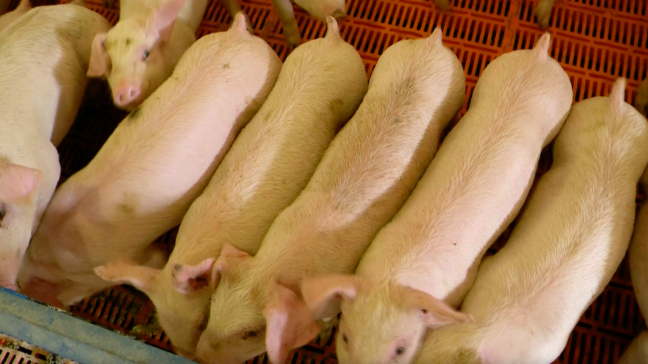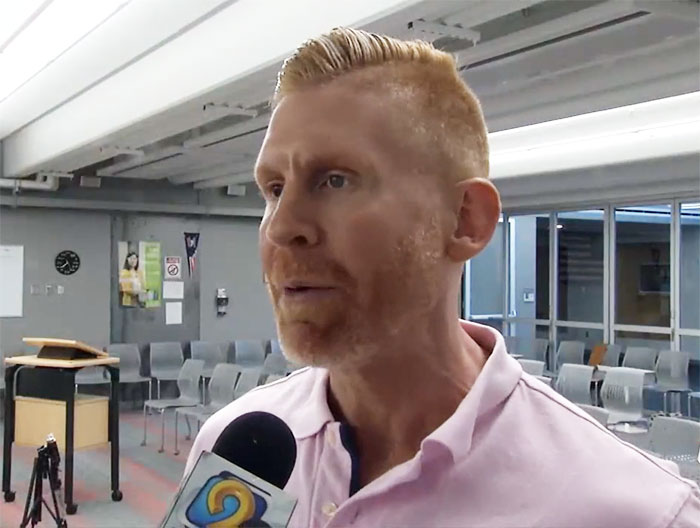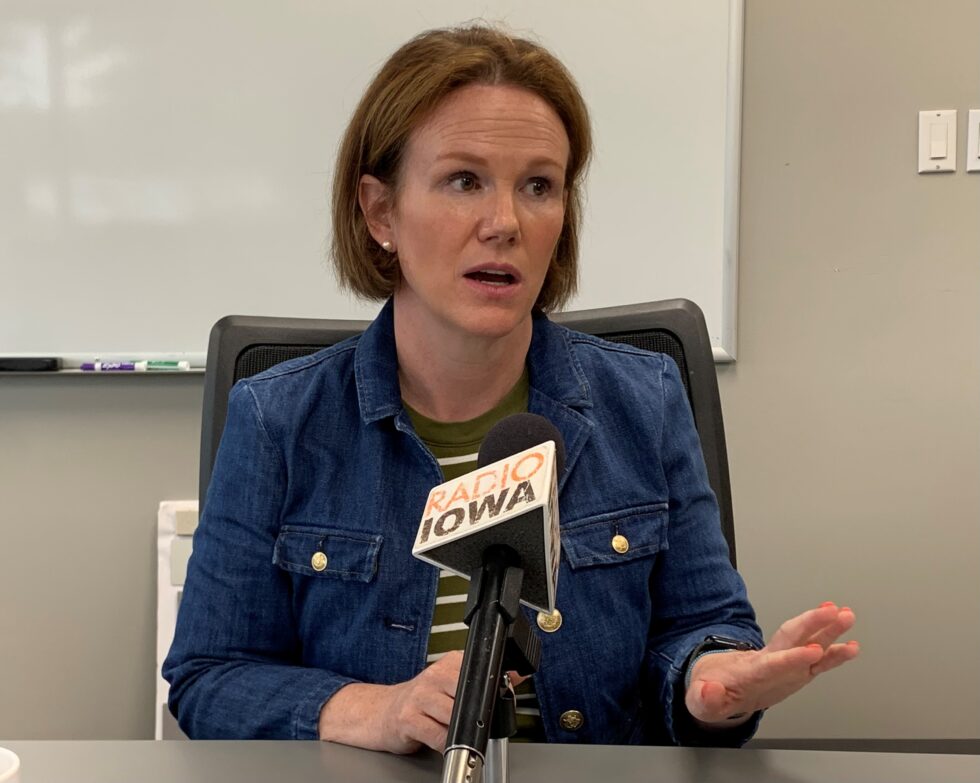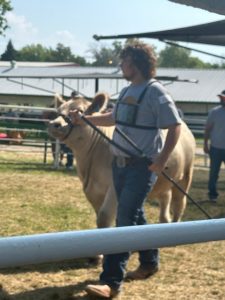KJAN News can be heard at five minutes after every hour right after Fox News 24 hours a day!
Keep up-to-date with Fox News Radio, Radio Iowa, Brownfield & the Iowa Agribusiness Networks!

KJAN News can be heard at five minutes after every hour right after Fox News 24 hours a day!
Keep up-to-date with Fox News Radio, Radio Iowa, Brownfield & the Iowa Agribusiness Networks!
(Des Moines, Iowa) – Two racehorse owners at Polk County’s Prairie Meadows Racetrack and Casino are suing the national nonprofit horseracing organization that collects taxes and fees from owners. The Iowa Capital Dispatch reports Joseph A. Kelly of Des Moines, a thoroughbred racehorse owner who owns three horses that race at Prairie Meadows, and Douglas L. Anderson of Arkansas, who owns two horses that race at Prairie Meadows, are suing the Horseracing Integrity and Safety Authority in U.S. District Court for the Southern District of Iowa. HISA is a nonprofit corporation based in Lexington, Kentucky, to which the federal government has delegated the power to assess taxes and fees against all trainers, owners, breeders, jockeys, racetracks, veterinarians, and other people by a state racing commission.
The lawsuit has its origins in one element of an omnibus budget bill approved by Congress in December 2020 and which, according to the lawsuit, provided for a “takeover of the thoroughbred horseracing industry by a private organization.” The legislation, known as the Horseracing Safety and Integrity Act, took authority from state regulatory bodies, such as the Iowa Racing and Gaming Commission, and transferred it to the privately operated, self-regulating, nonprofit HISA. “Despite wielding the power of the federal government, HISA is not funded by it,” the lawsuit notes. “Instead, this private, independent corporation — whose board of directors is not appointed by the president or any elected official — is funded entirely by ‘assessments’ on either the states or on the thoroughbred horseracing industry.”
The assessments, which take the shape of fees or taxes, are used to cover HISA’s budgetary expenses. HISA is charged with developing and implementing a national horseracing anti-doping program and a racetrack-safety program. In 2022, HISA notified the Iowa Racing and Gaming Commission that it was imposing fees on Iowa totaling $953,400. The Iowa Racing and Gaming Commission opted not to provide HISA with that funding, in part because its budget doesn’t provide for such an expense. HISA then turned to Prairie Meadows, Iowa’s only horseracing track, and informed the administrators there that the burden of paying the fee would be shared equally by “the track and the horsemen” there – although no definition of “horsemen” was provided.
It was expected that the Iowa Horsemen’s Benevolent and Protective Association would pay the horsemen’s half of the fee. In 2023, HISA told the Iowa Racing and Gaming Commission the state’s second round of fees would total $1,187,942. Again, the commission opted not to make that payment, so the obligation fell to Prairie Meadows and its horsemen. By then, the Iowa Horsemen’s Benevolent and Protective Association had already offered to “assist” Prairie Meadows with the payment of such fees but only after what it called the exhaustion of all legal options to “fully stop the outright unconstitutional takeover of horseracing in Iowa.”

Horse racing at Prairie Meadows (photo from the OFFICIAL Prairie Meadows Backside Information Page)
With the benevolent association still withholding payment of the 2023 and 2024 horsemen’s share of the assessments, HISA wrote to Prairie Meadows representatives and said they were “frustrated and angry” with the stalemate. HISA allegedly stated that if the benevolent association did not pay the horsemen’s share, HISA would force Prairie Meadows to impose a “starter’s fee” on all owners as a condition of having their horses run at the track, with the revenue passed on to HISA. On July 3, 2024, HISA informed Prairie Meadows that because the issue remained unresolved, it would begin imposing the starter fee. As part of their petition to the court, Anderson and Kelly say they are “now forced to bring this lawsuit” to stop HISA from imposing that fee and collecting the revenue.
The two owners note that in a letter to Iowa officials, HISA reported that the proposed fee is intended to cover the cost of defending the lawsuits that have been filed challenging the constitutionality of HISA’s actions. To date, HISA has spent more than $2 million on such litigation. HISA, Anderson and Kelly argue, is now passing its legal costs “onto the very people” who filed the lawsuits against HISA. The two men are asking the court to “stop the unconstitutional assessments and bring HISA’s unlawful reign to an end.”
The United States Court of Appeals for the Fifth Circuit has twice declared that portions of the Horseracing Safety and Integrity Act are unconstitutional, while the Court of Appeals for the Sixth Circuit has upheld the law in the face of broad constitutional challenges. The Court of Appeals for the Eighth Circuit, where Iowa is located, currently has the issue under consideration.
(Council Bluffs, Iowa) – An Iowa company is suing its marketing partner for $7 million in damages caused by alleged errors in attempting to sell fuel-grade ethanol produced in Iowa and Nebraska. The Iowa Capital Dispatch reports Southwest Iowa Renewable Energy, or SIRE, is a Council Bluffs-based company that has hundreds of member ethanol producers in Iowa, Nebraska, Wisconsin, Minnesota, and 18 other states. It is suing a Missouri company, Bunge North America, with whom it partnered to sell SIRE-produced ethanol.
SIRE is a dry-mill grain processing facility that each year produces millions of gallons of fuel-grade ethanol from grain that originates in southwest Iowa and southeast Nebraska. Bunge is an agronomic business focused on the purchase, storage and eventual sale of products, including ethanol, within North America. In the ethanol market, it’s common practice for ethanol producers such as SIRE, to contract with ethanol marketers tasked with finding buyers who are willing to purchase the commodity at the highest possible price and then negotiating with rail lines and trucking companies to achieve the lowest possible rates for shipping the ethanol. In order to do all of that, the lawsuit alleges, ethanol marketers must have expertise related to complicated and ever-changing federal and state renewable fuel standards.
In 2020, SIRE contracted with Bunge to market and sell all of SIRE’s ethanol in return for a monthly fee. The lawsuit claims that until November 2022, Bunge successfully marketed SIRE’s ethanol though a single Bunge employee, Jeremy Ragan, who was conversant with ethanol buyers and well versed in SIRE’s objectives. However, at the end of November 2022, Ragan informed SIRE that Bunge had terminated his employment. In the weeks that followed, the lawsuit claims, Bunge had inexperienced workers trying to market SIRE’s ethanol but who sold the product at old or incorrect values. In addition, the lawsuit accuses Bunge of failing to submit the necessary paperwork order for it to sell SIRE’s ethanol in California.

SIRE ethanol plant (company Facebook photo)
The lawsuit alleges that those and “other deficiencies and errors have resulted in SIRE losing profits on, at times, a daily basis … Bunge’s deficient marketing services have cost SIRE at least $7 million dollars between October 1, 2022, through December 31, 2023. SIRE’s damages have continued to accrue daily.” The lawsuit, filed this week in U.S. District Court for the Southern District of Iowa, seeks “at least $7 million,” plus interest, for breach of contract and unjust enrichment.
(Radio Iowa) – Iowa State University researchers estimate a viral disease cost the U-S pork industry more than one-billion dollars each year between 2016 and 2020. Porcine reproductive and respiratory syndrome or PRRS (PURS) can be deadly for pigs, and it can reduce a sow’s ability to give birth to healthy piglets. Derald Holtkamp, an I-S-U professor in veterinary diagnostic and production animal medicine, says it’s hard to stay ahead of PRRS because it mutates so quickly. “Several times we thought we had the PRRS virus kind of sorted out,” Holtkamp says. “We thought we had solutions to control it and within a few years, we are made to look stupid again. It just has this ability to continually evolve.”

Piglets (ISU photo)
Researchers say the economic impact in 2020 was 80-percent higher than it was a decade ago, mostly due to higher rates of pig herds getting infected and poorer productivity in infected herds. “The only way to really slow that down or prevent it is with biosecurity,” Holtkamp says. “We have to get better as an industry of preventing that virus from moving from one farm to the next or prevent it from getting into farms.” That includes taking extra precautions, Holtkamp says, like sanitizing livestock trailers.
(story contributed by Rachel Cramer, Iowa Public Radio)
(Radio Iowa) – The Waterloo School Board voted 5-2 Monday in favor of a $165 million plan that would build a new high school onto the existing Central Middle School to combine East and West High Schools.
Students in tenth through 12th grade would go to the new high school and eighth and ninth graders would go to the current West and East High buildings. KCRG TV reports many people spoke against the plan, citing the timing of the project and the economic impact they believe it will have. One man says recent layoffs at John Deere is one issue.“It’s too much at this time. You’ve got people here in Waterloo losing their jobs every day….a lot of those jobs are high end jobs the engineers at Deere….and this is just another burden on those folks and myself.”
Waterloo Superintendent Jared Smith, tells KCRG TV this new high school will help students better access the district’s career focused classes and draw new students to the district. “There’s a barrier right now let’s be honest, that kids don’t want to leave their home high school.. so having a school where all high school were all students 10 thru 12 have direct access to the career center removes all the barriers,” Smith says.

Waterloo Superintendent Jared Smith. (KCRG TV photo)
When asked if he had any comments on the objections to the plan raised at the meeting Smith said “The community who showed up and shared some concerns those are fair comments, those are fair concerns, those are concerns we have been talking through for the last year, the last several years.” Smith says they know Waterloo has been hit hard recently with the developments at John Deere and some other businesses closing, but he says the timing is never gonna be right.
The proposal would use a one-cent sales tax to allow the district to raise the revenue without having a bond issue vote. Voters living in the Waterloo Community School District who are opposed to the plan have until August 12th to present a petition to the school board with signatures from more than 30 percent of active voters to force a vote on this decision. Construction is expected to be started in the Spring of 2025, and the school is expected to be open in time for the 2028-2029 school year.
(Radio Iowa) – By next July, Iowa’s 13 treatment systems for mental health and the 19 networks that provide treatment for substance abuse and gambling addiction are to be unified and streamlined. The map officials have developed divides the state into seven districts and each district would provide mental health and addiction services, but Iowa Department of Health and Human Services director Kelly Garcia says those district lines will impact providers — not patients.
“For the consumer, for the Iowan the map doesn’t matter because in this redesign you can go anywhere,” Garcia says, “…so I don’t want us to get too caught up in those boundary lines respective to what Iowans need because it won’t matter any more and that is a distinction from today’s system.” Garcia says another key part of the new system will be clearly designated “access points” for care.

Iowa Department of Health and Human Services director Kelly Garcia spoke during an interview with Radio Iowa (File photo)
“Where do you go if your child is in crisis? What brightly lit entry point do you go to? I can tell you I get panicked calls all the time from parents, school administrators, sometimes from people who work in this field and can’t figure it out for themselves and that’s unacceptable,” Garcia says. “We can do better here.”
The plan will also create a separate system for Iowans with disabilities. Disability services are currently handled through the state’s mental health regions. State officials say they are unsure how many Iowans will be affected by these changes, as many Iowans getting care for a mental health issue are also getting treatment for a substance use disorder.
(Iowa News Service) – For Iowa students thinking about attending college in the fall, an interactive online “Tuition Tracker” can help them figure out some of the costs ahead of time. The tool can be especially useful to people attending college for the first time. The Tuition Tracker lets a student calculate the “real costs” by seeing not only the published tuition but the cost of other needs, showing them what they might end up actually paying.
Andrew Koricich, executive director of the Alliance for Research on Regional Colleges at Appalachian State University, said a tool like this can be helpful for students in rural areas. “Whenever you have rural students, many of whom are still going to be the first in their families to go to college, maybe coming from communities where there aren’t a lot of folks with college experience, tools like the Tuition Tracker can be really important,” Koricich explained.
The tool also allows students to compare college costs using their household income, seeing what people like them have paid in the past and what to expect if they decide to enroll. It was developed by the online education publication The Hechinger Report. The latest Tuition Tracker update also shows historical data, such as student retention and graduation rates. Koricich acknowledged no matter how accurate the data, many factors can affect the actual price of college and it could sometimes be lower than what the tracker reflects.

Close up of federal financial aid application with calculator and tuition statement
“It is a very complicated thing that includes a lot of variables,” Koricich noted. “You can have state grant programs that may not be reflected in the net price, even though any in-state student attending that institution will receive that grant.” Koricich recommended doing additional research, including visiting the website of each school the student is interested in to get the most up-to-date information.
(Radio Iowa) – A southeast Iowa man was stabbed to death around 1 a-m today (Tuesday) and a suspect is in custody. When officers arrived at the scene, they made contact with 40-year-old Jeffrey Johns who suffered a stab wound to his torso. Johns was transported to the hospital but died from his injuries.
At 9:12 A-M a search warrant was executed at an Ottumwa residence and 32-year-old Joshua Michael of Ottumwa was found hiding in the attic. Michael was arrested and charged with first-degree murder.
Michael is currently being held without bond in the Wapello County Jail pending a hearing with a magistrate judge.
DES MOINES — U.S. Representative Zach Nunn (IA-03) today announced mobile office hours across the Iowa Third Congressional District to assist constituents who may not be able to travel to one of the congressional offices located in Creston, Des Moines, and Ottumwa. At these mobile office hours, Iowans will be able to get help from their Congressional office with Social Security, Medicare, passports, visas, veterans’ benefits, military records, tax returns, and other issues with federal government agencies.
“My top priority is providing exceptional service and support to Iowans,” said Rep. Nunn. “My hope is that these mobile office hours will ensure ease of access for all Iowans to receive assistance from my office regardless of where they live in the Third District.”
The (area) schedule for August mobile office hours is below:
Adair County
Fontanelle Public Library
303 Washington Street, Fontanelle, Iowa
Thursday, August 1, 2024
10:30 a.m. – 11:30 a.m.
Madison County
Earlham Public Library
120 Chestnut Avenue, Earlham, Iowa
Wednesday, August 7, 2024
2:00 p.m. – 4:00 p.m.
Cass County
Atlantic Public Library
507 Poplar Street, Atlantic, Iowa
Wednesday, August 14, 2024
1:00 p.m. – 3:00 p.m.
Adams County
Prescott Public Library
607 Second Street, Prescott, Iowa
Tuesday, August 20, 2024
2:00 p.m. – 4:00 p.m.
Ringgold County
Matura
306 South Garfield Street, Mount Ayr, Iowa
Wednesday, August 28, 2024
10:00 a.m. – 12:00 p.m.
Page County
Essex Lied Library
508 Iowa Avenue, Essex, Iowa
Thursday, August 29, 2024
10:00 a.m. – 12:00 p.m.
Montgomery County
Villisca Public Library
204 South Third Avenue, Villisca, Iowa
Thursday, August 29, 2024
1:00 p.m. – 3:00 p.m.
Additional dates and locations will be announced in the future.
 Jace Thomsen of Cumberland had an emotional Cass County Fair. He was named as the Fair Prince during the royalty coronation to begin the fair. That gave him a chance to hand out awards and interact with many of the young 4-H and FFA members. He won a lavender award with his heifer in the FFA Beef Show on Monday. But, what happened at the livestock sale to close the fair on Tuesday left a number of people with misty eyes.
Jace Thomsen of Cumberland had an emotional Cass County Fair. He was named as the Fair Prince during the royalty coronation to begin the fair. That gave him a chance to hand out awards and interact with many of the young 4-H and FFA members. He won a lavender award with his heifer in the FFA Beef Show on Monday. But, what happened at the livestock sale to close the fair on Tuesday left a number of people with misty eyes.
Jace lost his dad, 60 year old Jeff “Swampy” Thomsen, earlier this summer.
Local auctioneer Mark Venteicher said raising and preparing the cattle for the fair was something Jace and his father enjoyed doing together. So, Mark and some friends decided to make the sale of that heifer a big one. The packer price from Tyson Foods was set at $1.95 per pound on the 1,234 pound heifer. Venteicher and Massena Livestock Sales, along with Anita Vet Clinic, Dave Steffen, 21st Century Co-op, Houghton State Bank, Dan’s Welding, Bill Hosfelt, Curt Behrends, Steve Jorgensen, Tanner Farms, Mike Pellett, Darrin Shafer, Mitch Kleen, Glenn Sonntag, Greg Zellmer and Dave Williamson pooled their money together to provide Jace with a purchase price of $9.25 per pound, making the total on the animal $11,414.50.
Venteicher said they wanted to show support for Jace and provide some money for college.
It was, of course, the biggest sale from another successful livestock auction at the Cass County Fair.
(Iowa DNR News) – Pheasant hunters across the northern half of Iowa had an excellent season last year, and many are looking forward to what 2024 has in store. The fall forecast will be based on the Iowa Department of Natural Resources’ (DNR) annual roadside pheasant counts, that begins Aug. 1.
The statewide survey is conducted by Iowa DNR staff between Aug. 1-15, who drive 225, 30-mile routes on gravel roads at dawn on mornings with heavy dew. Hen pheasants will move their broods to the edge of the gravel road to dry off before they begin feeding, which makes them easier to count.
In June the DNR issued its annual prediction for the roadside counts, which uses a weather model based on the snowfall, rainfall and temperatures from the past winter and spring. The model provides a best guess at what the counts might look like, and it is predicting numbers to be likely lower than last year.

A pheasant flying over corn. (DNR photo)
But the best indicator for the fall season is the August roadside survey that counts actual pheasants seen along more than 6,000 miles of rural, gravel roads.
The August roadside survey has been conducted over the same routes since 1962. In addition to pheasants and quail, the survey collects data on partridge, cottontails and jackrabbits. Results will be posted online at www.iowadnr.gov/pheasantsurvey in early September. Iowa’s pheasant season begins Oct. 26.